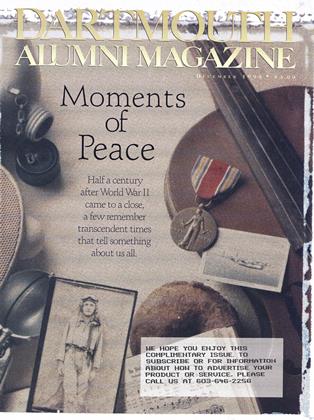It was being heralded as a monumental moment: five more women than men matriculated in the class of 1999, making it the first female majority class in Dartmouth history.
Sure I was excited. But, frankly, the news just didn't seem that big of a deal to me. Maybe I wasn't feminist enough, or maybe this wasn't as much my milestone as it was'someone else's.
So I talked with some freshmen. It certainly was their milestone. Most indeed thought that achieving gender paritywas worth celebrating.
They seemed honored to be part of this class. As Abi Holt '99 pointed out, this is the last class to graduate in the twentieth century, lending the whole genderparity thing a fillip of poetic justice. Alisa Antokowiak '99 reminded me that the admissions office actually admitted more men than women to the class; more women than men chose to come
Not all freshmen, however, thought the occasion to be so historic. "Perhaps 50 years ago a female majority would have been big news, but it is not today," said Michael Gottfried '99. "When the administration makes such a big fuss over its accomplishment, it makes it seem as though Dartmouth has taken a great leap forward. Actually, Dartmouth is only catching up."
Everett Wood '38 couldn't get excited about it either. "Several more women than men is no reason for alarm or jubilation on any side," he said. His sentiments were echoed by Cassie Ehrenberg '96, who argues that gender parity is not gender equity. "There's still a lot of work to be done to achieve real equality for women on this campus," she said. Wood laments the loss of Dartmouth traditions that will never again be revived; Ehrenberg worries that the progressive Dartmouth has yet to be.
And then I found a group of alumnae who are professors and trustees of Dartmouth, and they put the whole matter into perspective. Susan Ackerman 'BO is a religion professor who also happened to lead my freshman trip. When she was an undergraduate, she awoke one morning to find a banner over Gile saying, "Quahogs, Go Home." Maybe gender parity is so significant precisely because I can't tell a story like that. "It's a symbolic notch on the belt for those of us who want to show the world that Dartmouth is a congenial place for women to be," said Trustee Susan Dentzer '77. The message must be catching on; women are clearly choosing Dartmouth.
And so they will, I hope continue to choose it. They'll decide to attend a Dartmouth where both sexes are treated with respect, a Dartmouth where women no longer feel like intruders. It's a Dartmouth where statistics like these won't really matter; they'll fluctuate with each passing year.
It's also a Dartmouth that never would have evolved without those brave women who were in the minority for so long. I wouldn't have wanted to attend their Dartmouth. And yet part of the significance of today's numbers lies in the experiences of the classes that weren't so equally balanced. Without their Dartmouth, I would never be here at mine.
The numberof '99 womennosed out themen for thefirst timeever.
 View Full Issue
View Full Issue
More From This Issue
-
 Cover Story
Cover StoryMoments of Peace
December 1995 By Stephen Madden -
 Feature
FeatureNice Work if You Can Get It
December 1995 By DIANE CYR -
 Feature
FeatureWAR AND REMEMBRANCE
December 1995 By James Wright -
 Article
ArticleDr. Wheelock's Journal
December 1995 By "E. Wheelock" -
 Article
ArticlePreparing for Contingencies
December 1995 By James O. Freedman -
 Article
ArticleControlling Self-Control
December 1995 By Karen Endicott
Suzanne Leonard '96
-
 Article
ArticleKnowing The Dead
SEPTEMBER 1994 By Suzanne Leonard '96 -
 Article
ArticleTHE PRESIDENT GOMES TO TOWN
June 1995 By Suzanne Leonard '96 -
 Article
ArticleDollars and Pounds
October 1995 By Suzanne Leonard '96 -
 Article
ArticleWhat I "Won't Be Doing on My Spring Break
APRIL 1996 By SUZANNE LEONARD '96 -
 Article
ArticleCONFIDENCE TAKEN CONFIDENCE BUILT
MARCH 1997 By Suzanne Leonard '96 -
 Article
ArticleThe Masculine Mystique
MAY 1999 By Suzanne Leonard '96








